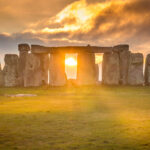The Winter Solstice marks the day with the shortest period of daylight and the longest night of the year (in the Northern Hemisphere), all thanks to the tilt of the earth. In many cultures, the day is a day of feasting and celebration, but even if you’re totally agnostic, you can still find a reason to rejoice, because after today, you’ll see gradually shorter nights and longer days, which means you can look forward to the emergence of spring.
Winter Solstice timeline
The Universe was created, including the Sun and the Earth.
This is the latest possible date for the construction of the monument that revolves around the sun’s orbit
The monument was shut for 16 years after rioting broke out between police and revelers for several years
Stonehenge is reopened
The sun will enter its dwarf stage before dying, affecting life in the Universe
Winter Solstice Activities
Do a solstice ritual
You can mark the solstice in line with the local rituals where you live, or you could take inspiration from Pagan tradition where on the eve of the solstice, you meditate in darkness and then welcome the birth of the sun by singing chants and Pagan carols. You’ll need plenty of candles, and a fireplace or outdoor fire circle to burn a Yule log.
Fly to Stonehenge
Modern druids gather at Stonehenge in England to mark the festival each year. If you stand in just the right place inside the Stonehenge monument on the day, facing east through the entrance towards a stone outside the circle called the Heel Stone, you’ll see the sun rise above the heel stone. That’s pretty sophisticated and precise construction for a monument built at least 3,000 years ago, and most who’ve seen it agree that it’s a once-in-a-lifetime experience.
Make a resolution
New Year’s Eve may be the traditional day for resolutions, but what better day than the Winter Solstice to write yourself a couple of notes. On one note, write down an aspect of the year past that you want to let go of, and on the second note, write down an aspiration or wish that you’d like to fulfill in the year to come.
Why We Love Winter Solstice
It’s full of symbolism
Whether or not you happen to be sensitive to long hours of darkness, it’s impossible not to interpret this day as an optimistic turning towards brighter moments. Across the world, various holidays have been celebrated on this day in various spiritual and religious traditions, but they all have an element of rebirth and renewal involved.
It’s a reminder of how small we are
The word “solstice” comes from the Latin word "solsitium," which means, “the Sun sands still.” That’s because on this day, the sun reaches its Southern-most position as seen from the Earth, and seems to stand still at the Tropic of Capricorn before it changes direction. It’s hard to focus on your own small problems and concerns if you’re thinking about these huge planets and their movement through the universe, don’t you think? And that’s why we love it. For the sense of perspective.
It’s going to be easier to get out of bed from now on
Seasonal affective disorder affects around 20% of Americans, when the reduced light, warmth and color of winter leave a person feeling down, irritable, and tired. It can make it hard to function during the winter months, affecting relationships and even just the ability to get out of bed and get on with your day. For those who find winter a slog, the knowledge that the planet keeps on turning and things will get easier from now on can be a blessed relief.
Winter Solstice dates
| Year | Date | Day |
|---|---|---|
| 2025 | December 21 | Sunday |
| 2026 | December 21 | Monday |
| 2027 | December 21 | Tuesday |
| 2028 | December 21 | Thursday |
| 2029 | December 21 | Friday |





















